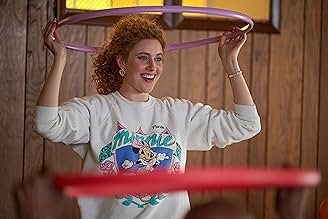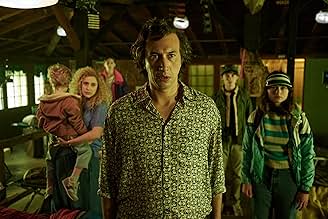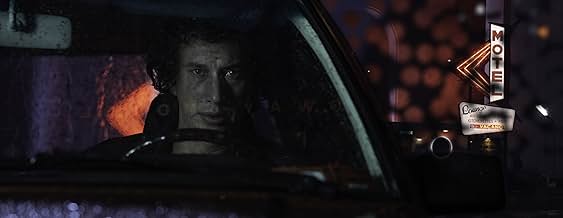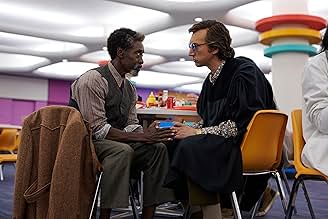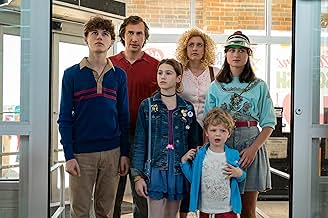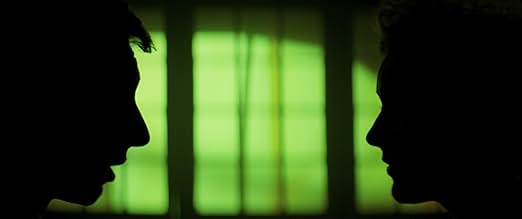VALUTAZIONE IMDb
5,7/10
46.691
LA TUA VALUTAZIONE
I tentativi di una famiglia americana contemporanea di affrontare i conflitti mondani della vita quotidiana mentre è alle prese con i misteri universali dell'amore, della morte e della possi... Leggi tuttoI tentativi di una famiglia americana contemporanea di affrontare i conflitti mondani della vita quotidiana mentre è alle prese con i misteri universali dell'amore, della morte e della possibilità di felicità in un mondo incerto.I tentativi di una famiglia americana contemporanea di affrontare i conflitti mondani della vita quotidiana mentre è alle prese con i misteri universali dell'amore, della morte e della possibilità di felicità in un mondo incerto.
- Premi
- 2 vittorie e 25 candidature totali
Wickham Reeve
- College on the Hill
- (as Wickham Bermingham)
Mathew Williams
- College on the Hill
- (as Matthew Williams)
Recensioni in evidenza
I have to admire Noah Baumbach for following up Marriage Story with White Noise. Apart from each starring Adam Driver and centring on a family, the two couldn't be more different. One's a deeply emotional, easy to follow, and very moving family drama, and the other one... well, it's White Noise.
It's got a premise that's hard to describe. There's a disaster which causes a great deal of panic for much of the film, but it's not the film's entire focus. In some ways, it feels a little like three short films all starring the same characters, and it's a bit hard to figure out how it all connects sometimes.
The movie reminded me of other wild, unpredictable, all over the place movies in recent years, like Inherent Vice and Under the Silver Lake, but both of those felt like they had more method to their madness, and were consistent with their craziness.
White Noise definitely isn't bad though. Adam Driver is as great as always, there were some funny parts, and much of the first hour or so is quite exciting. I'd say it's the final 45 minutes that have a few parts that drag, but then again, it builds to a good final scene, so make of that what you will.
I look forward to seeing what people say when this drops on Netflix (but who knows whether it'll get much attention - it can be hard to predict what will trend). I have no shame in admitting that maybe some of the discussion will help me understand the parts of this film that I didn't quite get from watching it just now.
(Also, if the Academy Awards don't nominate the LCD Soundsystem song written for this movie for Best Original Song, then they're cowards and/or they have no ears).
It's got a premise that's hard to describe. There's a disaster which causes a great deal of panic for much of the film, but it's not the film's entire focus. In some ways, it feels a little like three short films all starring the same characters, and it's a bit hard to figure out how it all connects sometimes.
The movie reminded me of other wild, unpredictable, all over the place movies in recent years, like Inherent Vice and Under the Silver Lake, but both of those felt like they had more method to their madness, and were consistent with their craziness.
White Noise definitely isn't bad though. Adam Driver is as great as always, there were some funny parts, and much of the first hour or so is quite exciting. I'd say it's the final 45 minutes that have a few parts that drag, but then again, it builds to a good final scene, so make of that what you will.
I look forward to seeing what people say when this drops on Netflix (but who knows whether it'll get much attention - it can be hard to predict what will trend). I have no shame in admitting that maybe some of the discussion will help me understand the parts of this film that I didn't quite get from watching it just now.
(Also, if the Academy Awards don't nominate the LCD Soundsystem song written for this movie for Best Original Song, then they're cowards and/or they have no ears).
It's funny when you encounter a film with so many likeable elements that simply never cohere into something that works. This film reminded me of "I Heart Huckabees" in that sense ... I enjoyed all the parts considered in isolation, but the film itself is decidedly less than the sum of it's parts.
The film is divided into three acts. We're introduced to star professor of Hitler Studies Adam Driver and his wife Greta Gerwig and their children (almost all from different spouses) in the first act, which gestures at parodying academia without really landing much.
In the middle act, a train crash causes the Airborne Toxic Event ... a cloud of poisonous chemicals that descends on town and causes the family to evacuate. This is the most successful part of the film, impressively staging the event like a darkly comedic disaster film.
The final act is ... a lot less clear and probably best not spoiled. It deals with our need to distract ourselves from the terrors of life with medicine and consumerism. It descends into talky meandering and is really only saved by a magnificent musical number over the end credits.
There's really a lot to like. I found it to be intermittently quite funny. The performances are great, especially Don Cheadle as a fellow professor trying to establish a specialization in Elvis Studies. It's a hugely ambitious film with a unique visual style. I only wish I could say I actually liked it.
The film is divided into three acts. We're introduced to star professor of Hitler Studies Adam Driver and his wife Greta Gerwig and their children (almost all from different spouses) in the first act, which gestures at parodying academia without really landing much.
In the middle act, a train crash causes the Airborne Toxic Event ... a cloud of poisonous chemicals that descends on town and causes the family to evacuate. This is the most successful part of the film, impressively staging the event like a darkly comedic disaster film.
The final act is ... a lot less clear and probably best not spoiled. It deals with our need to distract ourselves from the terrors of life with medicine and consumerism. It descends into talky meandering and is really only saved by a magnificent musical number over the end credits.
There's really a lot to like. I found it to be intermittently quite funny. The performances are great, especially Don Cheadle as a fellow professor trying to establish a specialization in Elvis Studies. It's a hugely ambitious film with a unique visual style. I only wish I could say I actually liked it.
White Noise is, undoubtedly, the strangest movie Netflix has released this year, which is saying a lot given the competition. The plot is all over the place, the dialogue very stylized, and the overall atmosphere is engaging but off-putting. It's the type of movie that is sure to cause a lot of division in audiences.
At its core, White Noise is about a college professor named Jack and his middle class family dealing with their fear of death, but what actually happens is quite complicated. So complicated, in fact, that it feels like three separate movies smashed together. To be fair, the novel is just as ungainly and incoherent, but at least you had the sense that you were the one with the problem. There was a mystique to DeLillo's writing that made it seem like there was a lot going on thematically with the strange choices. But in the movie? It just seems like bad, pretentious writing. I'm not even sure if Baumbach knew what DeLillo's aim was, or if he just guessed.
One symptom of this is that the unnatural dialogue stick out like a sore thumb: in a scene where Jack's wife, Babette, says how open she is with communicating her feelings, Driver says "That is the point of Babette." In another moment, Jack is shopping with his coworker when said coworker suddenly says that Jack's wife's "hair looks important." What is the point of lines like this? Because all it accomplishes is taking you out of the moment and reminding you that you're watching a movie with a script. Not to mention the multiple long, unintelligible "philosophical" monologues that occasionally pop up. Is it an intentional commentary on the hollowness of academia? If so, then why are they presented so uncritically and played dead straight? It's just another disjointed element of the movie that seems unfinished.
But even if the script fails them, the cast and tech crew don't give up on trying. Driver and Gerwig give very different performances, the former acting almost like an intentional caricature of a sitcom dad, and the latter trying to be serious the whole time. And yet it's one of the few disparate combinations in the film that actually pays off: their acting is convincing as a real couple. Gerwig, in particular, brings emotion to scenes that were completely absent of it on the page. The production design and score are also on point, creating a distinct and interesting atmosphere that also furthers the film's supposed social commentary. But none of this is quite enough to save White Noise from itself and its shortcomings.
The best part of the film is far and away the end credits. I'm not saying that as some sort of flippant joke about the movie's quality, it's a genuinely incredible sequence. Somehow it captures the exact type of weirdness and existentialism and fun that's absent from the rest of the movie. It's so good that, in all honesty, you could probably skip the rest of the movie for it. White Noise is consistently watchable and unique, unlike anything else you'll see this year. But it's aimless, confused, and ultimately baffling to make any significant impact.
Final Score: 62/100.
At its core, White Noise is about a college professor named Jack and his middle class family dealing with their fear of death, but what actually happens is quite complicated. So complicated, in fact, that it feels like three separate movies smashed together. To be fair, the novel is just as ungainly and incoherent, but at least you had the sense that you were the one with the problem. There was a mystique to DeLillo's writing that made it seem like there was a lot going on thematically with the strange choices. But in the movie? It just seems like bad, pretentious writing. I'm not even sure if Baumbach knew what DeLillo's aim was, or if he just guessed.
One symptom of this is that the unnatural dialogue stick out like a sore thumb: in a scene where Jack's wife, Babette, says how open she is with communicating her feelings, Driver says "That is the point of Babette." In another moment, Jack is shopping with his coworker when said coworker suddenly says that Jack's wife's "hair looks important." What is the point of lines like this? Because all it accomplishes is taking you out of the moment and reminding you that you're watching a movie with a script. Not to mention the multiple long, unintelligible "philosophical" monologues that occasionally pop up. Is it an intentional commentary on the hollowness of academia? If so, then why are they presented so uncritically and played dead straight? It's just another disjointed element of the movie that seems unfinished.
But even if the script fails them, the cast and tech crew don't give up on trying. Driver and Gerwig give very different performances, the former acting almost like an intentional caricature of a sitcom dad, and the latter trying to be serious the whole time. And yet it's one of the few disparate combinations in the film that actually pays off: their acting is convincing as a real couple. Gerwig, in particular, brings emotion to scenes that were completely absent of it on the page. The production design and score are also on point, creating a distinct and interesting atmosphere that also furthers the film's supposed social commentary. But none of this is quite enough to save White Noise from itself and its shortcomings.
The best part of the film is far and away the end credits. I'm not saying that as some sort of flippant joke about the movie's quality, it's a genuinely incredible sequence. Somehow it captures the exact type of weirdness and existentialism and fun that's absent from the rest of the movie. It's so good that, in all honesty, you could probably skip the rest of the movie for it. White Noise is consistently watchable and unique, unlike anything else you'll see this year. But it's aimless, confused, and ultimately baffling to make any significant impact.
Final Score: 62/100.
As someone who didn't read the book the movie is based on, i will say that i did not connect with this movie or the characters. Am ok with not connecting with characters but the characters in this movie are hard to understand which is odd because they talk and talk (usually at 100 miles an hour and over each other) so you think they would be all out in the open but it was like a wall between them and me. Like i completely failed to understand what it was that the author was saying about the world or the country when he wrote the book. Though i assume that the book was making some sort of commentary about the state of affairs because this movie feels somewhat too large in scale to just be a movie about coming to term with mortality and the difficulties that can arise in a marriage. Like the movie isn't bad but what are you? I will watch it again when it comes out on Netflix to try and see it with fresher eyes but if the purpose of the movie is to frustrate people so much that we rewatch it multiple times, i will say that they will succeed.
Most of the reviews that I have read thus far were negative, or a bit overly kind. The low rating is likely due to people going out for a light story, expecting to see a disaster action flick or end of the world comedy. This is essentially a reflection on mans fear of his own mortality, or perhaps more specifically on a certain subcultures fixation on their own impending end. If you take the movie as a series of reflections on that idea, and most of the characters as representations of certain personality types, perspectives and ideologies, then it all makes a lot of sense. And, it is pretty damn (darkly) funny as well. Enjoy.
Lo sapevi?
- QuizThis is Noah Baumbach's first time writing and directing a book-to-screen adaptation, and only his second adaptation after co-writing the screenplay for Fantastic Mr. Fox (2009).
- BlooperIn the opening scene, many vehicles featured in Murray's crash sequence reel are from the 1990s and 2000s, whereas White Noise takes place in the 1980s.
- Curiosità sui creditiThere is a scene at the end where the characters dance in a supermarket. As the credits start to roll, this sequence is played partially in reverse as the music continues to play normally.
- Colonne sonoreLincoln Portrait
Written by Aaron Copland
I più visti
Accedi per valutare e creare un elenco di titoli salvati per ottenere consigli personalizzati
- How long is White Noise?Powered by Alexa
Dettagli
- Data di uscita
- Paesi di origine
- Sito ufficiale
- Lingue
- Celebre anche come
- White Noise
- Luoghi delle riprese
- Wellington, Ohio, Stati Uniti(Storefronts are built out and set up for July filming)
- Aziende produttrici
- Vedi altri crediti dell’azienda su IMDbPro
Botteghino
- Budget
- 145.000.000 USD (previsto)
- Lordo in tutto il mondo
- 71.728 USD
- Tempo di esecuzione
- 2h 16min(136 min)
- Colore
- Proporzioni
- 2.39 : 1
Contribuisci a questa pagina
Suggerisci una modifica o aggiungi i contenuti mancanti



